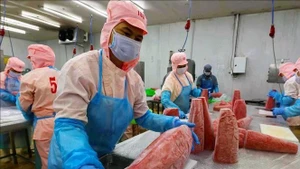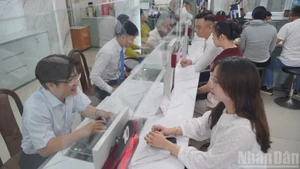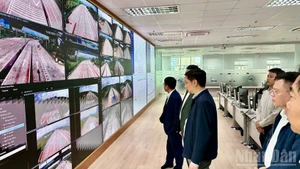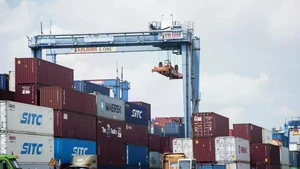The additional assessment report on socio-economic development results in 2022 and the implementation of the Government's plan for 2023 sent to the National Assembly Standing Committee, has emphasised the main results of the programme.
Over 87.3 trillion VND disbursed
That is recovering and rapidly developing production and business activities, promoting growth drivers, prioritising several important industries and fields, and striving to achieve the goals of the 2021-2025 period.
The programme has helped reduce costs, support cash flow, ensure initiative, create favourable conditions for businesses and people; ensure social security and people's lives, especially the workers, the poor, the vulnerable, and those heavily affected by the epidemic.
Notably, the disbursement of the programme’s development investment capital plan has contributed to speeding up the construction of 1,109km of highways and completing many other important infrastructures of the economy.
According to the Government's report, the disbursement volume of support packages under the programme so far has reached about 87.3 trillion VND in total resources, of up to 350 trillion VND.
Credit loans through the Bank for Social Policies reached over 16.9 trillion, interest rate support reached over 1.3 trillion VND; tax, fee and fee reduction was more than 57 trillion VND, and opportunity cost support through the extension of tax payment time and land rent was 7.4 trillion VND.
However, besides the achieved results, the implementation of support packages has still faced many difficulties and obstacles, which limit the effectiveness of the policy while some support packages have expired.
Notably, the 2% interest rate support policy had very low results. It is expected that by the end of 2023, only about 2.570 billion VND will be disbursed while the total capital of the support package is up to 40 trillion VND.
The policy to support housing rent for employees has now expired, but the actual disbursement amount is just over 4.264 billion VND, equalling 57.2% of the total estimated resources.
The reason was pointed out that the implementation of the policy, appraisal of documents, approval and disbursement of funds for employees was slow at first.
The number of staff receiving and appraising dossiers is still lacking, has to be mobilised from many sectors and has not yet mastered the expertise. They have anxiety, fear of mistakes, and fear of responsibility.
The preferential lending policy through the Bank for Social Policies by the end of the first quarter of 2023, only reached 42.7% of the total policy scale, as decided by the National Assembly and is not expected to use up the programme's capital.
In addition, the completion of investment procedures, allocation and assignment of capital plans for some tasks and public investment projects under the programme, have not met expectations, and it is possible that the capital plan may not be fully disbursed.
Some projects did not complete investment procedures according to the time limit required by the National Assembly, leading to them not being able to continue to allocate capital. Some ministries, branches and localities have not been drastic in completing the project investment policy to proactively disburse the programme's capital.
Proposing to shift resources to effective policies
Entering the first month of the second quarter of 2023, many policies and solutions to remove difficulties for businesses and the financial market issued since the beginning of the year until now, have started to have an impact.
In addition, the resurgence of the tourism and service market has had a positive impact on several sectors of the economy.
However, difficulties and challenges are still mainstream, causing the pressure on macroeconomic management to continue to increase.
It is necessary to coordinate to accelerate the disbursement of public investment and the national socio-economic recovery and development programme, to reduce cash flow congestion; increase liquidity for the system, and clear all resources for development.
Dr. Can Van Luc, Chief Economist of the Bank for Investment and Development of Vietnam
Dr. Vo Tri Thanh, former deputy director of the Central Institute for Economic Management suggested, that the Government soon have its scenario so that the situation does not worsen, in addition to promoting domestic consumption, public investment, creating jobs, and injecting capital into the economy.
Internally, the economy is facing difficult problems in many areas, such as slow disbursement of public investment, legal problems and the weakening of the real estate market, and pressure to adjust the corporate bonds market, he said.
There should be synchronous coordination between ministries, sectors and localities participating in the development of an overall package of solutions, to enhance the linkage between policies to support growth, Thanh noted, adding that there should be solutions to increase the efficiency of implementing support packages to restore production of enterprises.
According to Dr. Can Van Luc, Chief Economist of the Bank for Investment and Development of Vietnam, it is necessary to coordinate to accelerate the disbursement of public investment and the national socio-economic recovery and development programme, to reduce cash flow congestion; increase liquidity for the system, and clear all resources for development.
The Government needs to step up the implementation of the programme to facilitate the disbursement of public investment, especially for key projects with high pervasiveness, with a focus on infrastructure projects.
At the same time, attention should be paid to policies on tax and fee exemption and reduction along with orientations and solutions to harmonise fiscal, monetary and financial policies, in the context of increasing international financial risks.
For support packages that are inefficient or have expired, but have not “spent” all the money, experts suggest that the Government submit to the competent authority for permission to transfer resources to other policies. implementation capacity and room, following the provisions of the law, including the 2% interest rate support package.
















